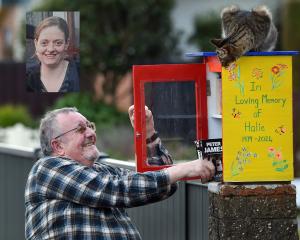
At one time the district with the highest number of cases in New Zealand, Southern now had just nine active cases of Covid-19 and had had no new cases for 17 days, as of Tuesday, he said.
‘‘We are continuing to plan for a scenario where we could see an increase in demand in intensive care unit beds but we are not implementing that, we are implementing a model with a very modest future demand.
‘‘We are keeping an eye on the forecasts but we have now moved very much back into the mode of how do we move forward with recovery planning.’’
The southern region has had two deaths from Covid-19 and 216 cases of the disease.
Both Mr Fleming and board chief medical officer Nigel Millar stressed that things could have been very much worse for the region had the Level 4 lockdown and public health response not been successful.
‘‘I’m reminded of that Fred Dagg song, ‘we don’t know how lucky we are’,’’ Dr Millar said.
‘‘Sadly, we have had people die in the Southern district, we have had people who have been unwell but in the scheme of things, given we have had the highest number of cases per head of population, our public health team have been extraordinary.
‘‘Without them, we would be lost.’’
Mr Fleming said there had been positive steps to improve public health messaging and contact tracing methods, and the way that primary and secondary care clinicians had responded to the challenge posed by Covid-19 had been remarkable, especially the team in Queenstown.
‘‘They were at the epicentre of Covid in Southern and they had by far the highest number of presentations to hospital, not just on sheer numbers but on scale, and they responded very well in a facility which wasn’t designed to cope with this sort of thing.’’
The SDHB was also working closely with the aged residential care sector to ensure Covid-19 did not get into southern rest-homes, he said.
‘‘The statistics do not lie, some 70% of the deaths in New Zealand have been in aged residential care ... moving forward, what are the screening processes for staff in aged residential care, what should the testing of residents be, and possibly even more importantly should the screening regime be at Level 2 when family and whanau go back and visit their loved ones?’’
The DHB was also planning for what Mr Fleming termed the ‘‘fourth wave’’ of cases — people who suffered from addiction, mental health, domestic violence or other health issues stemming from Covid-19 lockdown.
‘‘That could significantly overwhelm components of the sector if we don’t keep our eye on it and make sure we are supporting it.’’
Comments
After 8 weeks with only a fraction of patients in hospitals because of the focus "elsewhere" which did not eventuate, one would question the ability of the powers at be at planning & reacting adequately. Think about all the diagnosis/testing/treatments that have been put on hold. The cure may be worse than the disease- we know economically the hit will be long, hard and generational to recover. Health-wise we will see whether in 1-2 years the mortality rates have been worth the lockdown.












